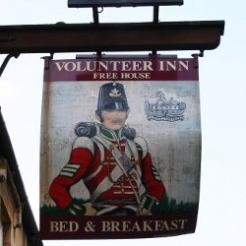Our weekly round-up of outlandish and interesting information collected from the corners of the charity sector.
Congratulations, you’ve volunteered
As WH Auden (the man who famously wrote the poem in Four Weddings and a Funeral) said: “We are put on this Earth to help others. What on Earth the others are here for, I don’t know.”
Obviously, we should celebrate those who help others, and Karl Wilding, now deputy grand high poobah at NCVO, has come up with a novel way of doing so: he's made a collection of pub signs celebrating the volunteer, which you can view on Pinterest.
Diary suspects that rather than the new-fangled volunteer who leads a scout troop or works in a charity shop, these pubs mostly celebrate the fact that they were recruiting-places for volunteer infantrymen during the 18th and 19th centuries.
Unlike most other countries, Great Britain did not introduce conscription in the army until 1916, and instead relied on private soldiers, hence the term private to refer to the lowest rank of infantryman.
(While we’re on the subject of derivations, the navy did conscript. It was known as pressing, but it was a bit ad hoc, and mostly involved rounding up any sailors you could find and shoving them on the boat. Hence the modern term press gang.)
Volunteers were offered the opportunity to “take the king’s shilling” – a literal payment of a shilling as a signing-on fee. A shilling was then quite a lot of cash, although in practice most of that cash was then taken from the new soldier because they were required to buy their own musket and uniform.
However, many of these men weren’t quite as willing as you’d think. Unscrupulous recruiting sergeants would often buy free beer in these pubs, but conceal a shilling at the bottom. A man taking a drink would reach the bottom of his pint, find a shilling, and discover he had volunteered.
We always hear that modern day charities are short of good treasurers. Maybe civil society should resurrect the practice, but this time, target accountants.
It's the Big Society in action
Has David Cameron’s big society been a success? Well perhaps as good an answer as any comes when you go to the website www.bigsociety.co.uk.
It’s a porn site. One which offers, among other things, Transsexual Brazilian Sex.
It’s big something, not big government, anyway.
Today is Sarcastic Friday
Much excitement earlier this week about the launch of Giving Tuesday, a new campaign to get people to give money to charity on the first Tuesday after the last Thursday of November.
If this seems like an oddly moveable feast, that’s because it’s a US invention, and is designed to act as a selfless counterbalance to the orgy of self-indulgence and online spending that is Thanksgiving, and the two shopping days which follow it, Black Friday and Cyber Monday, when Americans traditionally splurge on Christmas presents.
Naturally, none of this makes any sense in a UK context, but we’re going to do it anyway, in the hope it will convince the public to part with a few quid more. Let's hope it works.
Just to be helpful, Giving Tuesday launched on Wednesday.
When is an investigation not an investigation?
So you examine someone’s accounts, you quiz their trustees, and you open a regulatory inquiry placing your concern on an official footing. Are you investigating them?
Well, yes. But that doesn’t mean your actions constitute an investigation, at least according to the Charity Commission, who got in touch with Civil Society News last week to make this clear.
So what should this non-investigation investigatory behaviour be called? An operational compliance case, it appears.
Unfortunately, this means nothing whatsoever to 99 per cent of the population and in any case is too long to fit in a headline, which leaves rather a problem for the poor scribe given the job of describing the case. What should we call it instead? A probe? A look-into? A cursory-glance-at?
Sadly, the Commission has refused to directly answer this question, and instead suggested referring to pages 6 and 7 of its official guidance on Tacking Abuse and Mismanagement.
As the relevant section is 727 words long, may we suggest this is not an ideal answer either.









